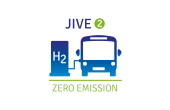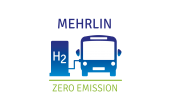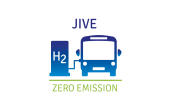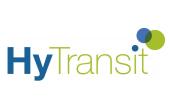Hydrogen Mobility Ireland (HMI) has announced the trial of a hydrogen-powered bus in the Dublin area. The bus, powered by a 60KW Toyota fuel cell, will be the first hydrogen fuel cell electric vehicle (FCEV) to be put into public service operation in Ireland.
This bus is part of the Department of Transport’s low-emission bus trials. The vehicle will be tested on various routes across Dublin by Bus Éireann, Dublin Bus, Dublin City University (DCU) and Dublin Airport from November to mid-December. The results will be part of the decision-making process to help further transition Ireland's public transport fleet to lower emission fuels and technologies.
This cutting-edge technology promises to make a considerable contribution to the climate challenge in Ireland, specifically in the transport sector. The zero-emissions Caetano H2.CityGold bus will run on green hydrogen (H2) produced in Dublin by BOC Gases Ireland Ltd using renewable electricity and water.
The fuel cell bus is refuelled in minutes, similar to a conventional bus. Its electric driving force is obtained when the hydrogen molecules of its fuel combine with the oxygen molecules of the air in the fuel cell. The only output from the vehicle is water.
Eamon Ryan, Minister for Climate Action, Communication Networks and Transport, said, “Moving our urban bus fleet to cleaner and greener technologies is essential if we are to further reduce the carbon footprint of our public transport system and limit air pollutant emissions in our cities. Under the National Development Plan, Ireland committed to stop buying diesel-only urban buses and to transition to lower-emission alternatives.
Minister Ryan continued, “I am delighted to welcome this low emission trial of an H2.City Gold hydrogen fuel cell electric bus, with the assistance of Hydrogen Mobility Ireland and CaetanoBus. The bus runs on hydrogen produced in Dublin by BOC Gases and emits only water from its exhaust. The trial will provide us with real-world insight into the operation, refuelling and environmental impact of this innovative technology as well as enabling comparisons with the previously tested bus technologies.
Mark Teevan, chair of Hydrogen Mobility Ireland said, “Hydrogen Mobility Ireland was formed last year by a group of activist companies that want to move forward with the introduction of fuel cell transport here. By year’s end, we had published a roadmap to do so and are now focused on actual delivery. This 8-week trial marks the start of that new phase, and we intend to launch the first hydrogen refuelling stations, and hydrogen-powered vehicles for sale, during 2023. We see hydrogen fuel cell transport as being critical to delivering on the targets in the government’s 2019 Climate Action Plan and have, since the beginning, been working closely with the Department of Transport and other government stakeholders on its introduction.”
The trial will allow partners to test this technology in everyday driving conditions and at a difficult time of year in terms of climate, thus gaining valuable information on the potential for large-scale introduction of this technology in Ireland. The DCU/CIE also intends to obtain information and feedback from bus passengers.
The launch of this trial is a significant step which will be followed early next year by a National Transport Authority trial involving some fuel cell double-decker buses. At the same time, in Northern Ireland, the HMI member Energia will soon start production of H2 for road transport at a wind farm in county Antrim to be used as fuel for fuel cell buses in Belfast. The increasing pace of development is a visible confirmation that hydrogen for road transport is beginning to move into the delivery phase.
In addition to its use in transport, hydrogen is expected to play an essential role in the decarbonisation of many other sectors of the economy. HMI members are working together to make possible the delivery of hydrogen production from green energy, a nationwide network of H2 refuelling stations and a substantial supply of vehicles of different types, from cars and vans to buses, trucks and even trains.
Source: Government of Ireland, Irish Tech News.
Photo: Rahul Kanike on Unsplash







